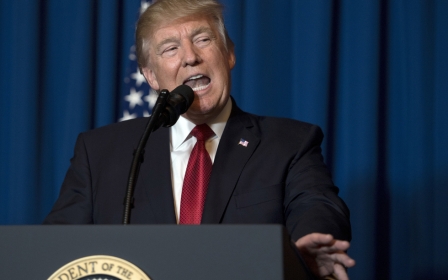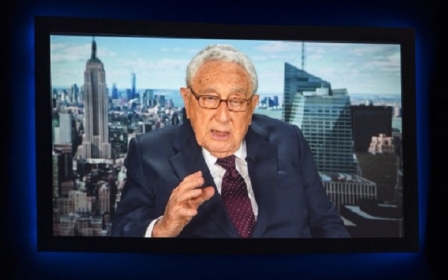US politicians and scholars debate legality of Syria strike
After the Syrian military’s alleged chemical weapons attack in Idlib province, US lawmakers urged President Donald Trump to consult with them before deciding on any military response.
Trump didn’t listen. Late on 6 April, a US Navy warship launched 59 missiles at the Syrian airbase where, according to US officials, the Assad government carried out its sarin gas attack on Khan Sheikhoun. Congress didn’t get a chance to debate, let alone vote, on the question of escalating US actions in Syria.
It was a snub to the members of Congress who wanted a full debate on US military action in Syria - and a violation, many argue, of the US Constitution. The strikes have angered lawmakers who are skeptical about the benefits of targeting the Syrian government.
Trump's actions have sparked debate both about the US Constitution - and who gets to decide on war - and also about whether the US should dive headfirst into the Syrian maelstrom, potentially escalating a complex conflict.
Skeptics of military intervention want, at the very least, an informed discussion on the possible outcomes of bombing Syria.
Two-dozen members of Congress were reportedly briefed about the strikes on the night they occurred. But Phyllis Bennis, director of the New Internationalism Project at the Institute for Policy Studies, said that briefing them “just ahead of a strike is not the same as consultation, and not the same as getting authorization, which is required”.
Bennis told Middle East Eye that Trump’s stated rationale for the strike - that it is a “vital national security interest” to prevent the spread of chemical weapons - does not justify the action. “Non-proliferation is fine. But whatever you think of it, it does not legalize the use of force to impose it,” she said. “So this was completely illegal. He was required by domestic law to consult and get authorization from Congress”.
Many legal scholars agree. Under the Constitution, Congress has the power to declare war, and the executive branch has the power to execute that power. But Congressional power on war has been eroded, particularly in recent years.
President Barack Obama, for instance, did not go to Congress to approve his war against the Islamic State group (IS) or his war on Libya.
Legal scholars also told Just Security that there is no authority under international law to wage war on Syria.
Syria does not directly threaten the US, so Washington was not acting in self-defence. And the UN Security Council did not give its blessing to the US cruise missile strikes.
Congress divided
To be sure, many hawkish members of Congress have welcomed Trump’s strikes. Senator Marco Rubio, a Republican from Florida and a reliable proponent of US military force, said the strikes showed that “President Trump has made it clear to Assad and those who empower him that the days of committing war crimes with impunity are over”.
But the libertarian wing of the Republican Party has shown skepticism. Senator Rand Paul, a Republican from Kentucky, said Trump needed to consult Congress.
“Our prior interventions in this region have done nothing to make us safer, and Syria will be no different,” Paul said in a statement.
Beyond the issue of legality, congressional members have also raised questions about whether Trump’s actions would entangle the US further in a conflict that has drawn in everyone from Qatar and Saudi Arabia to Russia, Iran and Hezbollah.
In a joint statement sent to Middle East Eye, Representatives Keith Ellison, Raúl Grijalva and Mark Pocan - leaders of the Congressional Progressive Caucus - said that Trump’s Syria strikes “could pull the United States into a regional war and escalate this unprecedented humanitarian crisis”.
The progressive lawmakers also said Trump should “immediately abandon his inhumane ban on refugees from Syria”.
Representative Tulsi Gabbard, a Democrat from Hawaii who courted controversy after visiting Syrian President Bashar al-Assad in January, went further than many lawmakers by questioning whether the Syrian president ordered the chemical weapons attack.
“This administration has acted recklessly without care or consideration of the dire consequences of the United States attack on Syria without waiting for the collection of evidence from the scene of the chemical poisoning,” Gabbard said in a statement.
She added that if Assad did commit the attack, she would call for the International Criminal Court to prosecute him.
It is unclear if the US missile strikes will heighten Washington’s involvement in the Syrian civil war, or whether it was a one-off operation meant to signal to Syria that Washington is serious about preventing chemical weapons attacks.
But in response to the strikes, the Russian government said it would bolster Syrian air defense. Even more significantly, the Kremlin announced that it would suspend its information-sharing channel with the US military designed to avoid clashes between the two air forces in the crowded skies of Syria, where the US is bombing IS and Russia is bombing various rebel groups.
To stave off further US escalation in Syria, the Friends Committee on National Legislation, a Quaker group long opposed to US intervention in Syria, is calling for a regional solution to the Syrian civil war that would bring Russia and the US together.
The group wants the Trump administration to “immediately meet with Russia, Iran, and the Gulf States to revive international negotiations that will lead to a diplomatic solution” in Syria. Other anti-war groups have issued similar calls.
Blatant violation
Opponents of further US involvement in Syria are calling on Congress to suspend its recess and come back to Washington to force a vote on any US military strikes on Syria.
Kate Gould, the Middle East policy director for the Friends Committee on National Legislation, said a vote on military action in Syria would be a first step for Congress to reclaim its war-making power.
“When we see this blatant violation of US and international law when Congress has been sidelined, it is more than worthy to bring Congress back and force a vote. That’s essential,” she told MEE.
Gould said that Congress could act to prohibit funding US military action in Syria. One bill, authored by Representative Barbara Lee, would block the US from allocating money to troop deployment in Syria.
The Institute for Policy Studies’ Bennis agreed.
“Congress should come back to Washington, and they should put on the agenda the question of whether or not to authorize military force in Syria,” Bennis told MEE. “And they should decide no. They should take the responsibility and say there is no money, not one penny to be allocated on war in Syria. Period, full stop.”
New MEE newsletter: Jerusalem Dispatch
Sign up to get the latest insights and analysis on Israel-Palestine, alongside Turkey Unpacked and other MEE newsletters
Middle East Eye delivers independent and unrivalled coverage and analysis of the Middle East, North Africa and beyond. To learn more about republishing this content and the associated fees, please fill out this form. More about MEE can be found here.





